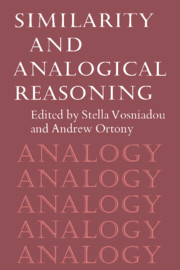Book contents
- Frontmatter
- Contents
- Preface
- List of contributors
- Similarity and analogical reasoning: a synthesis
- Part I Similarity and the structure of concepts
- Part II Analogical reasoning
- Part III Similarity and analogy in development, learning, and instruction
- 14 Analogical learning and transfer: What develops?
- 15 Analogical reasoning as a mechanism in knowledge acquisition: a developmental perspective
- 16 Remindings in learning and instruction
- 17 New approaches to instruction: because wisdom can't be told
- 18 Multiple analogies for complex concepts: antidotes for analogy-induced misconception in advanced knowledge acquisition
- 19 Comments on Part III: The activation and acquisition of knowledge
- Afterword: Comments on Parts I, II, and III: A framework for a theory of comparison and mapping
- Name index
- Subject index
18 - Multiple analogies for complex concepts: antidotes for analogy-induced misconception in advanced knowledge acquisition
Published online by Cambridge University Press: 22 October 2009
- Frontmatter
- Contents
- Preface
- List of contributors
- Similarity and analogical reasoning: a synthesis
- Part I Similarity and the structure of concepts
- Part II Analogical reasoning
- Part III Similarity and analogy in development, learning, and instruction
- 14 Analogical learning and transfer: What develops?
- 15 Analogical reasoning as a mechanism in knowledge acquisition: a developmental perspective
- 16 Remindings in learning and instruction
- 17 New approaches to instruction: because wisdom can't be told
- 18 Multiple analogies for complex concepts: antidotes for analogy-induced misconception in advanced knowledge acquisition
- 19 Comments on Part III: The activation and acquisition of knowledge
- Afterword: Comments on Parts I, II, and III: A framework for a theory of comparison and mapping
- Name index
- Subject index
Summary
Few would disagree that analogy is an important tool in the acquisition of new knowledge. Indeed, work in cognitive science and educational psychology in the last dozen years provides ample evidence of the usefulness of analogy in learning and has substantially advanced our understanding of the psychological mechanisms responsible for that utility (e.g., Burstein, 1986; Carbonell, 1986; Collins & Gentner, 1987; Gentner, 1983; Gentner & Gentner, 1983; Gick & Holyoak, 1980; Rumelhart & Norman, 1981; Vosniadou & Ortony, 1983). Yet, as this chapter will demonstrate, the use of analogies in learning is far from straightforward and, surprisingly, often results in deeply held erroneous knowledge.
Our intention is to offer a more temporized and cautionary alternative to the general enthusiasm for learning by analogy, especially in its most common form: the use of a single mapping between a source and a target concept (the “topic”) – what we shall refer to as a single analogy. (For exceptions that address more complex uses of analogy, see Burstein, 1986; Collins & Gentner, 1987). We argue that simple analogies that help novices to gain a preliminary grasp of difficult, complex concepts may later become serious impediments to fuller and more correct understandings. Specifically, although simple analogies rarely if ever form the basis for a full understanding of a newly encountered concept, there is nevertheless a powerful tendency for learners to continue to limit their understanding to just those aspects of the new concept covered by its mapping from the old one. Analogies seduce learners into reducing complex concepts to a simpler and more familiar analogical core.
- Type
- Chapter
- Information
- Similarity and Analogical Reasoning , pp. 498 - 531Publisher: Cambridge University PressPrint publication year: 1989
- 129
- Cited by



